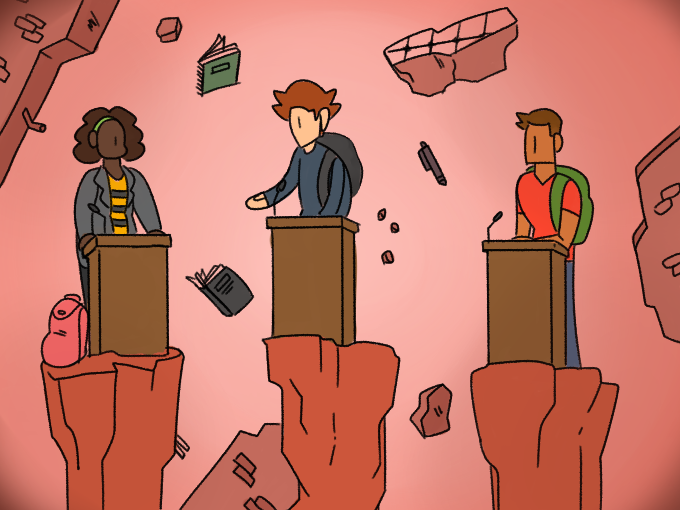Bite your tongue enough, and it will swell. Keep biting it, and it will keep swelling. Eventually, you’ll find that your bloated tongue impedes speaking. Either you’ll stop speaking, or you’ll sound like a muttering fool when you do.
The University of Texas is replete with tongue-biters. Students are too timid to voice their opinions, so they don’t — they bite their tongues. In today’s polarized political climate, their timidity is understandable. But it is tragic.
When people refuse to air their opinions, even their faulty opinions, they cannot be taught the truth. That is how falsehoods survive — not in an open debate, but in the internalized, unchallenged assumptions that never escape a tongue-biter’s lungs.
That is how free speech on campus ends — not with the government banging on doors, but with a tongue-biter’s submissive whimper.
Earlier this year, protesters at Texas Southern University shouted down Texas state Rep. Briscoe Cain. In response, Lt. Gov. Dan Patrick instructed the Senate Committee on State Affairs to investigate “censorship which violates the constitutional rights of students” on college campuses.
For all his bravado, Patrick’s well-meaning campaign for free speech leaves the main roadblock to free speech on campus untouched. The dominant barrier to free speech on campus is cultural, not legal. It’s a wrong that only students can make right. And to do that, students must stop biting their tongues.
Conservatives are often compulsive tongue-biters at progressive universities like UT. But the condition is spreading; progressives are beginning to bite their tongues, too.
Olivia Griffin , a Plan II, government and East Asian studies senior, is the membership director of the University Democrats. Speaking only for herself, she said that some of “the best Democrats you’ll ever meet (have been) almost harassed” for inadvertently offensive statements. “People aren’t having dialogues,” she lamented. “They’re ready to accuse rather than teach — it just exacerbates this (free speech) problem … We’re reaching a point at UT where people are afraid to express their views.”
“I think people almost look to be offended sometimes. They overanalyze and they assume bad motives,” she added.
The data confirms Griffin’s suspicions. According to Yale’s William F. Buckley, Jr. Program, 51 percent of college students felt intimidated when disagreeing with their classmates. A YouGov study conducted on the behalf of the Foundation for Individual Rights in Education reached a similar conclusion.
Although the YouGov/FIRE study found that students claim to feel comfortable sharing their opinions both inside and outside of class, it revealed that 54 percent of students practice self-censorship. In class, 48 percent of those students self-censored out of the fear that their peers would judge them. Outside of class, that number dropped to 38 percent.
In high school, people bite their tongues. In their professional lives, people bite their tongues. But universities differ from high schools and businesses. Students attend university to learn and to broaden their intellectual horizons. Ultimately, they attend university to better themselves. When two students disagree and engage in a civil discussion, both students learn and better themselves.
Patrick and his legislative busybodies can do nothing to confront free speech’s preeminent enemy on campus: a self-censoring culture. Only students can stop biting their own tongues. And we must stop, for it is right to do so. We must accept each other’s right to be wrong.
Howell is a history major from Dallas.





















